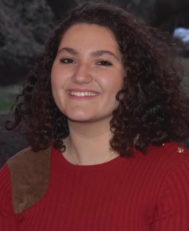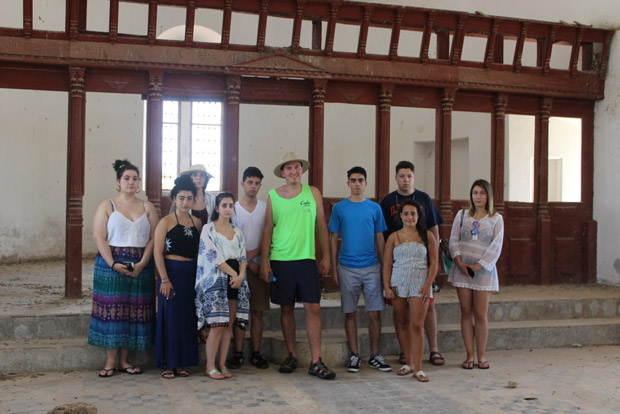AHIF Student Foreign Policy Trip Participants Describe their Personal Experiences (Sophia Kyrou)
The American Hellenic Institute Foundation (AHIF) Foreign Policy Trip to Greece and Cyprus completed its landmark 10th year as ten students from across the United States participated in the 17-day program held June 29 to July 6, 2018. The students’ insightful essays describe their personal experiences from the trip to Greece and Cyprus. Throughout the program, the students received firsthand experience regarding the foreign policy issues affecting Greece and Cyprus, their relations with the United States, and the interests of the U.S. in the Eastern Mediterranean.
Briefings and meetings were held with American embassies, officials from various foreign ministries, members of parliament, the armed forces, prominent think-tanks, and members of academia and the private sector of both countries. The principal events of the trip included a visit to the Turkish-occupied area in Cyprus and a day-trip to Naval Support Activity (NSA) Souda Bay, Crete, where the students toured the NATO Missile Firing Installation (NAMFI) and received numerous briefings. The 2019 Application can be found at https://www.ahiworld.org/students/policy-trip/
Reflections on a Case Study of Perception vs. Reality in International Affairs: Cyprus, Greece, Turkey, and the United States
by Sophia Kyrou

Sophia Kyrou
As the warm sun shines on my face and the salty water of the Mediterranean glides around my feet, I should feel relaxation and bliss. Instead, I feel anxiety, and an unsettling need to be aware of everything that is going on around me. It is July 2018, and I am on a beach in Famagusta (Ammochostos, in Greek), a ghost city in the Turkish occupied zone in Cyprus. Famagusta has all the trappings of a proper Mediterranean beach scene. That is, until you turn from the strikingly blue water and around towards the city—or what’s left of it.
Behind a few eerily empty beach bars is a stretch of taller, older buildings, all of which are bombed out. The bombed-out buildings—shells of what they once were prior to the 1974 Turkish invasion and occupation—stand as a physical reminder of what once was, and what is now. I turn to look at the guard tower fixed immediately behind the sand dunes connecting beach to road. Squinting, I see the figure of a Turkish occupation soldier and the unmistakable outline of his submachine gun.
This unsettling juxtaposition of settings and circumstances is a perfect microcosm of the way in which Turkey operates on the global stage. Underneath an inviting exterior lies a dangerous reality, ready to explode at any moment. My experience on the beach in the Turkish-occupied zone in Cyprus is only one of the many things I learned from the American Hellenic Institute’s Foreign Policy Trip. I took away similar lessons in the U.S., Greece, and elsewhere in Cyprus, but this example was perhaps the most disquieting exposition of the vast disconnect between perception and reality; between the possibilities that a strategic relationship with Greece and Cyprus promise and the stifled roles they are given; and between the polished image Turkey displays on the global stage and the true actions of the Turkish government. I have come away from the trip with the strong conviction that, in politics and media, perception and reality can be at variance with one another. With this, I know that perception must be reshaped.

The students in a desecrated church in the Turkish occupied area of Cyprus
Most importantly, I realized that my disappointment should not only be limited to Turkey or Turkish politicians. At the July 16th Russia-U.S. Summit in Helsinki, President Donald Trump showed his support for increasingly authoritarian President Recep Tayyip Erdogan by fist bumping him and saying that he “does things the right way.” In the days following the summit, the media was almost entirely occupied by a flurry of Trump- and Putin-induced hysteria. In stark contrast, on July 20, there was virtually no recognition to mark the 44th year of Turkey’s invasion and continued occupation of Cyprus in mainstream American media. This communicated to me that the world perceives Greece and Cyprus as peripheral countries that are not worth advocating for or protecting. As both a Greek-American and Cypriot-American, I have always been aware of the assets that Greece and Cyprus have to offer, but this trip helped me to solidify certain ideas, particularly about Greece and Cyprus’ role as pillars of stability in an unstable region, and about their unquestionable importance in the Mediterranean.
Geopolitically, Turkey undeniably occupies a highly strategic location, but Greece and Cyprus hold nearly identical strategic positions. Greece is a crossroads between Europe, the Balkans, the Middle East, and North Africa. It is a country situated at an essential point of the Mediterranean Sea that connects East to West. Cyprus provides an even closer window to the Middle East and North Africa, with almost immediate air and naval access to Israel, Syria, Egypt, and other countries in the region. Given these immense geographic advantages, it is foolish to overlook Greece and Cyprus’ vital geostrategic importance.
On the political and legal front, Greece and Cyprus are democratic, rule of law states that generously contribute to the European and global community. Something I was not aware of before embarking on this trip was that Greece is one of the few NATO members to meet NATO’s defense spending standard and, after the United States, is the country which spends the second-largest percentage of its GDP on defense. Greece and Cyprus abide by international law and human rights norms and have shown compassion to refugees and migrants. Turkey, on the other hand, routinely violates international law, infringes upon other states’ sovereignty, ignores human rights standards, funds Islamic terrorism, ethnically cleanses the indigenous Kurdish population within its own borders, and occupies the territory of a sovereign nation and EU member state—Cyprus. Despite these realities, Greece and Cyprus continue to be undervalued by the United States and much of the international community while Turkey, which continually violates international law, continues to be appeased.
I walk away from my experiences in Washington, D.C., Cyprus, and Greece both frustrated and determined. I am frustrated by the lack of international and U.S. support for Cyprus and Greece, as well as by the United States’ continued alliance with Turkey. I am determined, on the other hand, to do everything I can in the U.S. and abroad to contribute my all to liberating Cyprus and Greece from the injustices and threats they face from Turkey.
Sophia Kyrou, a sophomore at Trinity College, is double-majoring in Political Science and Human Rights and minoring in French. A Faculty Honors student and an 1823 Scholar, Sophia was acknowledged by Trinity’s Dean of Student Success as an emerging leader, invited to serve on Trinity’s Scholars Advisory Board and selected for Trinity’s Catalyst Leadership Program and for Venture Trinity. Sophia spent a gap year learning about Middle East geopolitics and Mediterranean migration to Greece, interning at Harvard Kennedy School’s Middle East Initiative and the GOARCH UN Office.











0 comments